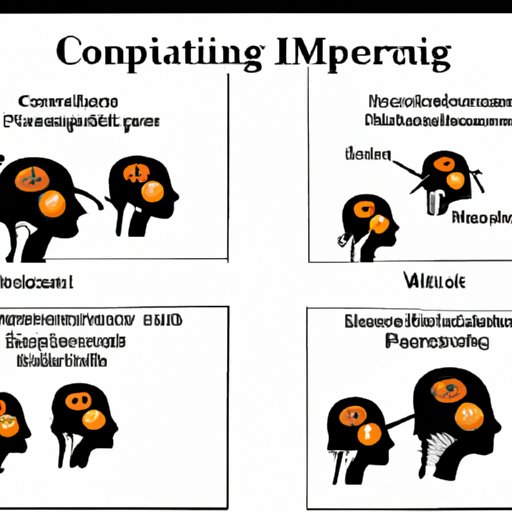Introduction
Consciousness is a difficult concept to define, but it can generally be understood as the ability to be aware of one’s environment and oneself, and to think and feel with intention. For centuries, philosophers have grappled with questions about the nature of consciousness, and whether it is something that can be explained scientifically. Now, modern neuroscience is beginning to provide some answers.

Examining the Neurological Correlates of Conscious Experience
Recent research has suggested that there are certain neurological processes associated with conscious experience. This evidence suggests that consciousness is related to specific patterns of activity in the brain, and to particular neurochemicals.
Brain Activity and Consciousness
Brain imaging studies have shown that conscious experience is associated with increased activity in certain areas of the brain, including the prefrontal cortex and the parietal cortex. According to Professor Anil Seth, a professor of Cognitive and Computational Neuroscience at the University of Sussex, “These areas, which are highly interconnected, are thought to be involved in attention, decision-making, and other higher level cognitive processes.”
Neurochemistry and Consciousness
In addition to changes in brain activity, conscious experience is also associated with changes in neurochemical levels. Studies have found that levels of the neurotransmitter gamma-Aminobutyric acid (GABA) are lower during states of consciousness than during states of unconsciousness. Similarly, levels of the neurotransmitter glutamate are higher during states of consciousness than during states of unconsciousness.

Exploring the Philosophical and Ethical Implications of a Scientific Explanation of Consciousness
If consciousness does indeed have a physical basis, then this could have profound implications for our understanding of human identity and behavior. It is possible that a scientific explanation of consciousness could lead to a greater understanding of mental health disorders, as well as ethical considerations such as the morality of artificial intelligence.
The Impact of a Scientific Understanding on Human Identity
If consciousness is physically based, then this could have significant implications for how we understand human identity. In an article for The Guardian, philosopher Stephen Cave suggests that “if consciousness is rooted in physical matter, then our identities are no longer seen as separate from our bodies, or as having a spiritual essence.” This could challenge traditional notions of selfhood and personal autonomy.
Uncovering the Mysteries of Consciousness
A scientific explanation of consciousness could also help to explain some of the more mysterious aspects of conscious experience, such as the phenomenon of lucid dreaming. According to psychology professor Matthew Walker, “Lucid dreaming is a state of consciousness where the dreamer is aware they are dreaming and can control their dreams in real time.” A scientific understanding of this phenomenon could lead to new insights into the nature of conscious experience.
Analysing the Potential Applications of a Scientific Understanding of Consciousness
A scientific explanation of consciousness could also have practical applications. For example, a better understanding of the neurological basis of consciousness could lead to new treatments for mental health disorders, as well as methods for enhancing cognitive performance.
Improving Mental Health
A scientific understanding of consciousness could potentially lead to new treatments for mental health disorders. According to clinical psychologist Dr. Steven Hayes, “By understanding the neural basis of consciousness, we may be able to develop new therapies that target the underlying brain mechanisms that are responsible for mental illness.”
Enhancing Cognitive Performance
A scientific explanation of consciousness could also lead to new methods for enhancing cognitive performance. Research has suggested that certain drugs, such as modafinil, can increase levels of alertness and focus. However, a fuller understanding of the neurological basis of consciousness could lead to more targeted and effective methods for improving cognitive performance.

Debating the Limitations of a Scientific Approach to Understanding Consciousness
Despite the potential benefits of a scientific explanation of consciousness, there are also some limitations to this approach. For example, consciousness is a subjective experience, and it may not be possible to fully explain this phenomenon using scientific methods.
Subjectivity of Consciousness
One limitation of a scientific approach to understanding consciousness is that consciousness is a subjective experience, and it cannot be measured directly. As philosopher David Chalmers argues, “We can measure brain states and behavioural responses, but these do not capture the subjective experience of consciousness.”
The Possibility of Alternative Explanations
Another limitation of a scientific explanation of consciousness is that there may be alternative explanations for this phenomenon. For example, some philosophers have argued that consciousness may be the result of a non-physical entity, such as a soul or spirit.
Conclusion
In conclusion, recent research has suggested that consciousness may have a physical basis, and that this phenomenon is associated with specific patterns of brain activity and neurochemical levels. While a scientific explanation of consciousness could potentially lead to new treatments for mental health disorders and methods for enhancing cognitive performance, there are also some limitations to this approach, such as the subjectivity of consciousness and the possibility of alternative explanations.
(Note: Is this article not meeting your expectations? Do you have knowledge or insights to share? Unlock new opportunities and expand your reach by joining our authors team. Click Registration to join us and share your expertise with our readers.)
